Photos and videos
Multimedia
-
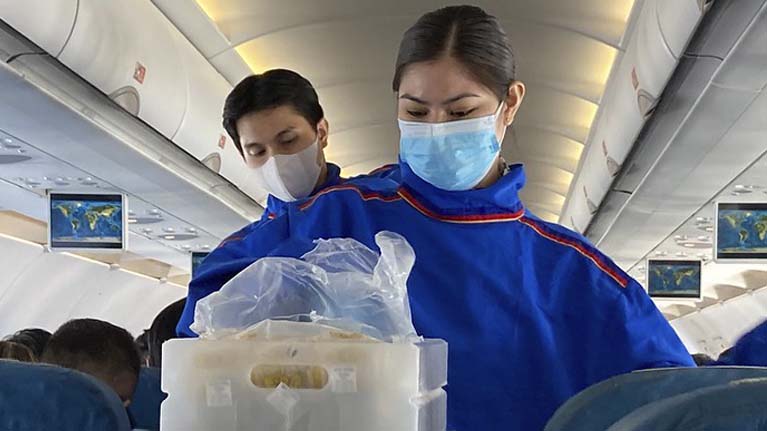
Download our photos from Flickr
Working lives in the Philippines
-

Watch our videos on Youtube
A human-centred COVID-19 recovery
2015
-
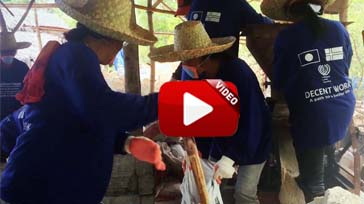
Disaster response
Rebuilding communities after Haiyan in Northern Cebu
15 January 2015
When Super Typhoon Haiyan (Yolanda) hit Northern Cebu it destroyed public and private infrastructure, wiped out livelihoods, and disrupted productive activities. The ILO focused its efforts on the industries of tourism, agriculture and construction, identified as key drivers of economic growth and stability in the typhoon-affected municipalities. The strategic approach was comprised of sub-projects under local public assets reconstruction, vocational skills training, and trade and enterprise development. The ILO’s work ensured a holistic livelihood recovery, building up communities for more sustainable development.
2014
-
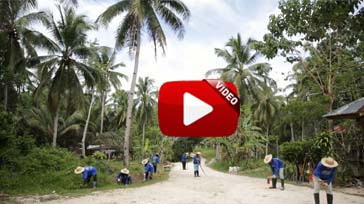
Disaster response
Paving the way to recovery after the Bohol earthquake
31 December 2014
On 15 October 2013, a 7.2 magnitude earthquake hit Bohol, which affected 348,507 people and damages amounted to Php1.38 billion. The ILO through its Employment Investment Intensive Programme (EIIP) addressed quick recovery of jobs and livelihoods affected through emergency employment and community based livelihood support. The ILO applied its crisis response approach and implemented an employment and livelihood recovery response which ensures a job-rich recovery process that is resilient to future natural disasters. A crucial component of the response was the rehabilitation of farm-to-market roads, enhancing the flow of people and goods and jumpstarting local economies.
-
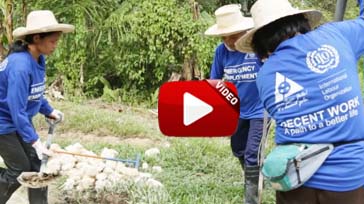
Disaster response
Paving the way to recovery after the Bohol earthquake: A training video
31 December 2014
This training video on the Employment Investment Intensive Programme (EIIP) features quick recovery of jobs and livelihoods after the Bohol earthquake in October 2015, through emergency employment and community based livelihood support. The ILO applied its crisis response approach and implemented an employment and livelihood recovery response which ensures a job-rich recovery process that is resilient to future natural disasters. A crucial component of the response was the rehabilitation of farm-to-market roads, enhancing the flow of people and goods and jumpstarting local economies.
-
Migrant workers
Toward the Implementation of Mutual Recognition of Skills in ASEAN countries
16 December 2014
This video discusses the mutual recognition arrangements (MRA) and the mutual recognition of skills (MRS) in ASEAN countries. Representatives from governments, employers' and workers' organizations as well as ASEAN Secretariat and the ILO share their views on the importance of MRS in the ASEAN Economic Community, coming into effect in 2015.
-
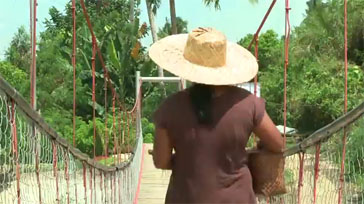
Natural disaster recovery
Building back better with decent work after Typhoon Bopha
12 November 2014
The Philippines is the third most disaster-prone country in the world. Typhoon Bopha, named Pablo locally, was the strongest storm to hit Mindanao in two decades. Working closely with the Australian Government and those affected on the ground, the ILO supported communities to build back better with decent work, livelihoods and social protection at the forefront of recovery.
-
Video
Haiyan: Planting seeds of the recovery
08 November 2014
A year after Super Typhoon Haiyan, known locally as "Yolanda" devastated parts of The Philippines, thousands of people whose lives depend on agriculture are still trying to cope. It wasn't only that farm fields cultivated for years were destroyed; farmers who knew only one way to provide for their families lost their livelihoods. But now there is new hope in the mountains and farm fields devastated by Haiyan.
-
Video
Haiyan: Building back better and greener
08 November 2014
Nearly 8,000 people were killed and nearly 15 million others were displaced when Typhoon Haiyan tore into The Philippines a year ago. In the aftermath of the country's worst-ever natural disaster, one of the most urgent challenges was restoring a way to make a living for the nearly 6 million people who were affected by the typhoon. Emergency employment programs were set up in the hardest hit areas. Now, a year after Haiyan, people have new job skills, and enterprises are beginning to emerge from the devastation.
-
Video
Building back better with decent work after Typhoon Bopha (Pablo)
25 September 2014
The Philippines is the third most disaster-prone country in the world. Typhoon Bopha, named Pablo locally, was the strongest storm to hit Mindanao in two decades. Working closely with the Australian Government and those affected on the ground, the ILO supported communities to build back better with decent work, livelihoods and social protection at the forefront of recovery.
-
Video
Tale of a Journey - Official Film Teaser
12 May 2014
Tale of a Journey features the experience of Filipino migrant health workers in Finland as it also brings in the perspective of sending and receiving countries. Government, employers and workers share their insights for a more balanced view of migration. The film is produced by the ILO Decent Work across Borders: A Pilot project for Migrant Health Professionals and Skilled Workers, with funding support from the European Union and in partnership with the Asia Pacific Film Institute.
-

People's Television Network
ILO to provide more jobs for typhoon Haiyan survivors in Philippines
08 January 2014
Philippines state television reports on the ILO's efforts to help create jobs for survivors of super typhoon Haiyan (Yolanda). Together with the Philippines Department of Labour and Employment, the ILO is running a short-term emergency employment programme, which will develop into longer-term activities including skills development training.
2013
-
Video
Rebuilding through emergency empoyment after Typhoon Yolanda (Haiyan) on ANC ShopTalk
21 November 2013
ABS-CBN News Channel's ShopTalk hosted by Ria Tanjuatco-Trillo interviewed ILO Director Lawrence Jeff Johnson on the impact of Typhoon Yolanda (Haiyan) on people's lives and livelihoods. Emergency employment must start on day one after the disaster.
-

Video
ABS-CBN Red Card to Child Labour
01 October 2013
ABS-CBN artists hold up the Red Card and lend their voices against child labour. In 2013, the Philippines has made significant progress in reducing the worst forms of child labour, but there are still 3 million Filipino children trapped in child labour, risking their health or even their lives and mortgaging their future. Spread the word and join the campaign to help children have a better future -- a future without child labour.
-
Video
US Ambassador to the Philippines and ILO: Red Card to Child Labour
26 September 2013
In 2013, the Philippines launched the Red Card to Child Labour. US Ambassador Harry Thomas, ILO Director Lawrence Jeff Johnson and ILO's International Programme on the Elimination of Child Labour Project Manager Giovanni Soledad hold up the Red Card to Child Labour. Child labour deprives girls and boys of their childhood, their potential and their dignity, and that is harmful to physical and mental development. What can YOU do to take action against child labour?
-
Video
Philippines: Hold up the Red Card to Child Labour!
12 September 2013
Phil and James Younghusband of the Philippine National Football Team hold up the Red Card to Child Labour. Over 3 million Filipino children are victims of child labour. A red card is used in sports like football to indicate a serious offense. Child labour, as a serious offense, deprives children of the chance to play, to study and to live a life with dignity.
-
Video
Landmark global treaty for domestic workers comes into force
05 September 2013
There are at least 53 million domestic workers worldwide, excluding child domestic workers. In an interview with Al Jazeera America, Lawrence Jeff Johnson of the ILO Country Office for the Philippines talks about the historic ILO Convention extending basic labour rights to domestic workers around the globe.
-
Video
Ending child labour: An interview with Lawrence Jeff Johnson on ANC Talkback with Tina Palma
05 August 2013
ABS-CBN News Channel's Talkback with Tina Palma interviewed Director Lawrence Jeff Johnson of the ILO Country Office for the Philippines on ending child labour in the Philippines. Talkback with Tina Palma is an interactive current affairs programme tackling political and social issues. Director Johnson along with officials of the Department of Social Welfare and Development (DSWD) and the United Nations Children’s Fund (UNICEF) talked about what government, communities and citizens do to end child labour.
-
Video
Creating human security through local economic development
15 May 2013
In Bondoc Peninsula, south-eastern part of Quezon Province in the Philippines, people earn less than US$1 per day. Lack of decent work, extreme poverty and armed conflict pushed people to vulnerable employment and forced them to accept whatever work is available just to survive. The ILO, FAO and the Office of the Presidential Adviser on the Peace Process implemented projects on local economic development, in partnership with the Government of Japan and the UN Trust Fund for Human Security. These projects reached out to over 5,000 individuals, bringing decent work, much needed income, and hope for their families and communities. These projects must continue.
-
Video
Creating human security through local economic development (full 15-minute video documentary)
15 May 2013
In Bondoc Peninsula, south-eastern part of Quezon Province in the Philippines, people earn less than US$1 per day. Lack of decent work, extreme poverty and armed conflict pushed people to vulnerable employment and forced them to accept whatever work is available just to survive. The ILO, FAO and the Office of the Presidential Adviser on the Peace Process implemented projects on local economic development, in partnership with the Government of Japan and the UN Trust Fund for Human Security. These projects reached out to over 5,000 individuals, bringing decent work, much needed income, and hope for their families and communities. These projects must continue.
-
Video
Creating a competitive labour force: An interview with Lawrence Jeff Johnson on ANC Inside Business
01 May 2013
ABS-CBN News Channel's Inside Business with Coco Alcuaz interviewed Director Lawrence Jeff Johnson of the ILO Country Office for the Philippines and former Labour and Employment Secretary, Mr Bienvenido Laguesma as part of Labour Day 2013. Director Johnson talked about achieving sustained and inclusive growth through decent and productive work. Director Johnson further highlighted the need to address vulnerable employment and to enhance productivity and competitiveness in the Philippines.
-
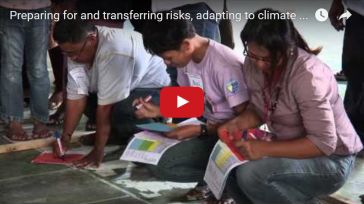
Video
Preparing for and transferring risks, adapting to climate change
09 April 2013
In the Southern Philippines, farmers' lives and the weather are intimately interwoven, but something is changing, now that the rains in Agusan del Norte are too heavy, the sun shines too fiercely. Now there's hope for poor farmers with the community-based approach monitoring and Weather Index-Based Insurance packages, to warn people when heavy weather is on the way.